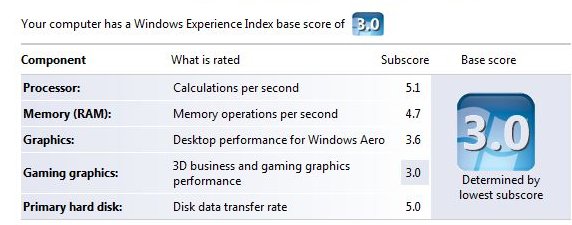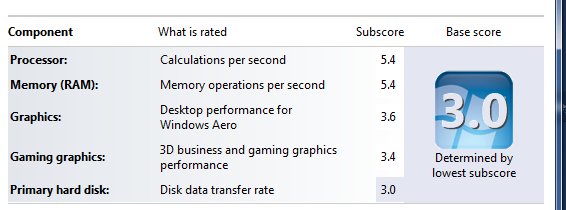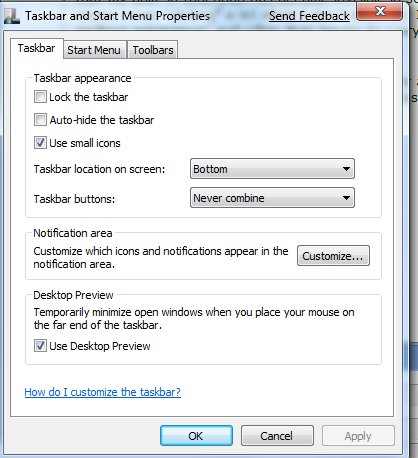 Sunday, 08 February 2009
I had read that Windows 7 did the perf calculations differently than Vista, so I thought I would compare them. I took a picture of my settings as part of the whole "back up everything three different ways" process before the upgrade (me? burned before? ya think?) and here's what it said:

After the upgrade, it said:

So the same conclusion, but drawn from different numbers. Bottom line is I could mess around with this laptop and it would be faster, but it works for my day to day use. And things feel zippier on Windows 7. Sleeping and waking up, for sure. And finding the files I want ... but that's about jump lists and previews.
Kate
 Saturday, 07 February 2009
Well, I did it. I put the Windows 7 beta on the laptop I use day in and day out. This machine had Vista on it, and the upgrade was utterly painless. All my software was still there and still working fine when the install was complete. The only glitch was that my built-in touchpad has become invisible in some way. This means I can't configure it to be less sensitive, which in turn means I was "clicking" a lot when I didn't mean to. I disabled it completely (using the 1980s-style UI of the edit-your-settings-on-boot experience) and other than having to carry a mouse with me when I take the laptop somewhere, there's been no other impact.
First impressions: I use jump lists a lot. Enough for a separate blog post. I like everything I noticed, except the default large-icons, no-text, group-everything setting on the taskbar. I fixed that:

(I've cropped it so it doesn't stretch the page)

I've said it before and I've said it again ... you can't really learn a product if you kick up a VPC once in a while but live your life in a different product. Windows 7 is stable enough to live in, and living in it will show what it's really like soon enough. I'm liking what I'm living.
Kate
 Friday, 06 February 2009
I've been saying for a while that the Vista Bridge is now a living project that gets updated. And here we have our second Code Gallery release already. I think it's worth saying again what I said when 1.3 was released:
Here you can download the latest version, join discussions, and report issues including native APIs you wish were wrapped. Remember, this is a sample library, not a product, so don't expect the kind of support, internationalization, or full coverage a product would have. Do expect useful code for reading (if you care about how to do interop well) or just using (if you want to light up your application with Vista features without knowing about interop.)
I've been doing quite a lot of speaking on this wrapper library and it really makes all the difference in the world if you'd like to adopt the latest OS functionality from your managed (C# or VB.NET) application.
I did a quick search to see who had been writing about our library and was a little surprised to find a Wikipedia entry: http://en.wikipedia.org/wiki/Vista_Bridge. But it turns out that's about an actual bridge, that cars drive on, on Vista Avenue in Portland Oregon. Ah well.
Kate
 Thursday, 05 February 2009
Should I be interested in a top 100 list I'm not on? Of course I should. Here's a list of developer blogs, painstakingly gathered by Jurgen Appelo. He looked at Google PageRank, Alexa traffic rankings, Technorati authority ratings, how many people link to the blog, commenting rate, and the RSSMicro FeedRank. In other words, an objective gathering of our collective subjective opinions of each other. While I have no clue how to measure any of those things, I can tell you I read 4 of his top ten and 11 of the top 100 at least once a week. If I were looking for more blogs to read, this list would include plenty of excellent candidates. Check it out!
Kate
 Wednesday, 04 February 2009
I like Scott Berkun's blog a lot. He often shares insightful glimpses of what it takes to achieve. In this entry, he talks about how ratsen fratsen hard it is to write a book. This reminds me that I don't want to write any more books (in case watching Julie finish hers wasn't reminder enough) and also connects to the trouble I sometimes have with other long term unstructured projects. Deciding to work on what needs to be worked on is how you show your character. Day in, day out. Don't like the character you're showing? Decide differently, starting today.
Kate
 Tuesday, 03 February 2009
Let me share with you something I heard on the TV the other night that really clicked with me. "As I get older," the man said, "I find that I ask myself questions more. You know, why am I here?". He paused, and I nodded. The older we get the more life we have to ponder the meaning of. Then continued. "It's not exactly philosophy though. It's more ... why am I here... in the basement? What the heck did I come down here for? "
Oh yeah. That I do even more than the pondering.
Kate
 Monday, 02 February 2009
The WPF team have released an interesting document called the WPF Application Quality Guide. You can download it as a .doc file from that page, or just read it on line. It's an intruiging combination of handy links (Getting Started with WPF), overview diagrams, philosophy and advice around testing and development that would apply to non WPF projects as well, and very WPF-specific practices (should I derive from Control or UserControl?) aimed at testers and developers alike. The Word version runs to almost 80 pages but not all the sections will apply to every reader. You should take a look at it, for sure.
Kaet
 Sunday, 01 February 2009
While I was in Redmond I met Alon Fliess, who like me is a C++ MVP and is exploring Windows 7 (and Vista before it) from a native point of view as well as a managed one. About two months ago he mused about the "rebirth" of C++ in these times, not just because some of those operating system APIs are easier to get to from native code, but also because of new native capabilities (the continued MFC updates, the native Web Services library, the concurrency services) that just keep being added to the arsenal available to C++ programmers. (He has some helpful links in the blog post - you could also search through here if you like.)
I think it's a good point. If you know C++, now's a good time to use it. If you don't, then hang around (at least virtually) with those who do - we can point out some cool things. And thanks to the magic of interop, wrappers, and C++/CLI, perhaps we can make some of those cool things a little easier to get to from managed code.
Kate
© Copyright 2025 Kate Gregory
Theme design by Bryan Bell
newtelligence dasBlog 2.3.9074.18820   | Page rendered at Friday, 26 December 2025 04:58:18 (Eastern Standard Time, UTC-05:00)
|
On this page....
Pluralsight Free Trial
Search
Navigation
Categories
Blogroll
Sign In
|